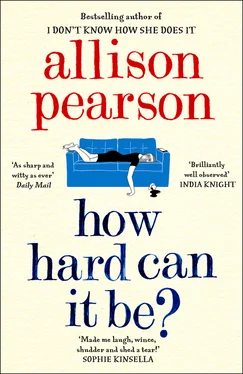3.15 pm: Fighting the urge to go upstairs and sleep. Can hardly put ‘afternoon napping’ down as part of my skillset on application form, although it’s the one thing I excel at these days. Probably Perry’s fault. With my CV immensely improved (although I’m not sure I’d dare show it to my Women Returners group) I brace myself for a call to Wrothly Social Services. Sadly, it’s too early for alcohol.
‘Your call may be assessed for training purposes.’
Here we go. You know when you’ve pressed five for one department and then you’ve pressed one from the Following Range of Options, although you think you may have misheard, and that maybe you needed three? And then you’ve pressed seven for Any Other Queries, and your hopes are getting up that you might be about to interact with an actual human being, when a recorded voice says, ‘Sorry. We are experiencing a high volume of calls. Your call is important to us, please hold the line’? And the phone rings and rings and rings and you picture a cobwebby office with a skeleton sitting in a chair at a desk and the phone on the desk it rings and rings and rings? Well, that’s what it feels like to be calling Wrothly Social Services.
By now, surely everyone has figured out that these multiple options are not designed to be helpful; they are supposed to act as a deterrent whilst giving the illusion of progress and choice. Even ‘your call may be used for training purposes’ is basically a threat, telling you to behave yourself or else. A mere twenty minutes elapse until I get through to someone in the right department, who then asks if he can put me on hold while he speaks to a colleague, who may or may not have access to Barbara’s case notes. I am almost tearfully grateful for this basic courtesy.
‘Hello? Can I help you?’
The voice does not sound at all helpful. In fact, she sounds as though she may recently have graduated from a bespoke Unhelpfulness training course – the one they send American border security staff on.
I know, let’s baffle her with politeness and friendliness.
‘Good afternoon, thank you so much. It’s great to talk to an actual person.’
No response.
‘So, I’m ringing on behalf of my mother-in-law, she has a burns injury …’
‘Barbara Shattock?’
‘Yes, that’s right. Great. Thank you so much. I spoke to my father-in-law earlier and he says that, unfortunately, there was a misunderstanding between Barbara and Erna, the carer you so kindly sent to help them.’
‘I’m afraid that your mother-in-law has been reported in connection with a possible hate crime,’ says the voice.
‘What? No. That can’t be right.’
‘Mrs Shattock racially abused one of our carers.’
‘Sorry? No. You’ve got that wrong. You don’t understand. Barbara, she’s eighty-five. She’s very confused. She’s not herself.’
‘Mrs Shattock accused her carer of not being able to speak English. At Wrothly, we take hate crime very seriously.’
‘Hang on. What hate crime? Erna is Lithuanian, isn’t she? She’s not a different race to Barbara. Do you even know what racism is?’
‘I’m not trained to answer that question,’ the voice says flatly.
‘But you’re making a very serious allegation.’
There is an icy silence into which I burble and plead: ‘I’m really sorry if there’s been a misunderstanding, but it’s simply not in Barbara’s nature to upset someone like that.’
That is a blatant lie. As long as I’ve known her, more than twenty years now, Barbara has been the princess of passive aggression, the empress of undermining. The world is full, as far as Barbara is concerned, of people who are Simply Not Up To It. The list of Simply Not Up To Its is long and ever-expanding. It includes news anchors with sloppy diction, women who ‘let themselves go’, tradesmen with dirty boots who don’t show sufficient respect to Axminster carpets, pregnant weathergirls, politicians who are ‘basically Communists’, and the fool responsible for a misprint in the Daily Telegraph crossword. A mistake in her favourite crossword and Barbara will act out the mad scene from Lucia di Lammermoor , calling for the head of the idiot who introduced an error into Twenty-Two Across.
As the lesser of her two daughters-in-law, it was established early on that I was Simply Not Up To It. I was hardly the girl Richard’s mother hoped her son would marry and she did very little to conceal her disappointment. Every time we visited, Barbara would ask without fail, ‘Where did you get that dress/blouse/coat, Kate?’ and not in a way which indicated she wished to go out and purchase one for herself.
One Christmas, I was in the pantry looking for tinned chestnuts when I heard Barbara say to Cheryl, the preferred daughter-in-law, ‘Kate’s problem is she has no background.’
It stung, not just the snobbery, but because Barbara was right. Compared to the comfortable, well-established Shattocks, my own family had a hasty, provisional feel. We were the Beverly Hillbillies, the supermarket’s basic range, and I know Barbara sensed it from the moment Rich first took me home. Luckily, he was so in love he didn’t notice her dig at my unmanicured hands. (I’d been decorating a junk-shop chest of drawers and the residue of grey-green paint looked like dirt beneath my fingernails.) I could put up with having my family patronised, my cooking dismissed and my choice of clothes derided, but the one thing I could never forgive Barbara for is that she has always made me feel like a bad mother. And I’m not.
Yet, here I am defending Barbara to the woman from social services because Barbara is no longer in any fit state to tell this woman that she is Simply Not Up To It. Which she clearly isn’t.
‘Has it occurred to you that it might be quite upsetting if you’re an elderly lady and the person washing you is a bit rough and she can’t understand what you’re saying? Are we allowed to say that? Oh, I see, we’re not allowed to say that. Pardon me.’
Uch . When did we become this nation of hateful automatons, unable to deviate from the official script to respond to genuine need and upset? All friendliness gone now, I channel my steeliest professional self and suggest that the voice gets another carer around to help Barbara and Donald asap.
‘Otherwise, Mrs Shattock might seriously hurt herself at which point Wrothly Social Services will be obliged to comment. On the evening news.’
‘I am not trained to answer that,’ I hear the voice say, followed by the dialling tone.
Well, that went well.
To: Candy Stratton
From: Kate Reddy
Subject: Headhunter Humiliation
Hi hon, thanks for the pep talk. I did a new CV as you suggested. Might enter it for Pulitzer Prize as piece of groundbreaking, experimental fiction. It’s not really lying if you know you can do all the things you haven’t done, is it?
I’ve been going to these Women Returners meetings. Don’t laugh. They’re really sweet and it’s making me realise how much luckier I am than those who quit when they had their first baby. Desperately trying to lose weight and get myself into shape, but I’m just so damn tired and wrung out the whole time. Hard not to raid the biscuit tin when you’re knackered! Not sleeping cos of night sweats. I have hog’s bristles sprouting out of my chinny chin chin. I’m so blind I can’t read the calories on any foodstuffs, which I’m not supposed to be eating anyway as I need to get into my Thin Clothes because I gave my Fat Clothes to the charity shop the last time I lost weight and swore I would never be fat again. Plus, I need to take a nap every afternoon. I have the energy of a heavily sedated sloth.
Читать дальше












